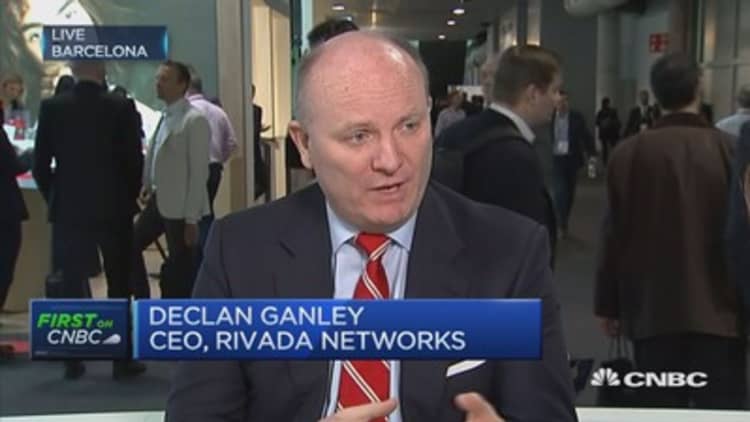
A $15 billion spectrum contract currently favored to be awarded to AT&T could impact its bid for Time Warner. That's according to Declan Ganley, the CEO of Rivada Networks, who says "it is hard to imagine the so-called 'FirstNet' contract not being an issue for the Federal Communications Commission."
FirstNet is the authority, created by Congress, tasked with building the first high-speed wireless broadband network in the United States dedicated to public safety providers such as police and firefighters.
Unlike other spectrum allocations, this is the first to allow one operator a uniform block in all 56 U.S. states and territories.
Rivada Mercury, a consortium including Rivada, Intel and network giants Ericsson, Nokia and Fujitsu, had been in the bidding for the FirstNet contract against AT&T.
But Rivada Mercury was excluded from the selection process leaving AT&T as the only company in the running for the contract at the end of 2016. Rivada has sued the U.S. government for what it says is its "wrongful exclusion."
The U.S. Court of Federal Claims in Washington will hear oral arguments in this case today.
"I believe that we will end up winning the case and ultimately the FirstNet contract to roll out the nationwide public safety broadband network," Ganley said.
The contract will give the winner 20 megahertz of spectrum in the low band space and is considered premium; often being described as the equivalent of "beachfront property" in real-estate terms.
According to some expert analysts, including those at Wells Fargo and UBS, the value of the FirstNet contract in spectrum terms is about $8 billion based on current auction prices. This comes with up to $7 billion in funding from FirstNet to help deploy and operate the network.
The spectrum for allocation is 13 percent of the total low band availability in the United States, which added to the 34 percent already owned by AT&T, would give it control of almost half the market.
Analysts at Wells Fargo have said the contract would be "very positive" for AT&T's stock.
At the Mobile World Congress in Barcelona, FCC Chairman Ajit Pai told CNBC "there is currently no reason for the AT&T-Time Warner deal to be reviewed."
When asked whether the FirstNet contract could change his mind he said: "I couldn't comment on anything that could alter the analysis of a merger review."
John Hodulik, a managing director at UBS and industry expert, said: "I don't think a FirstNet win would change that fact, despite the spectrum holding it would give AT&T."
He added that if the Department of Justice decides to block the deal, the "spectrum holdings won't be the issue."
The AT&T Entertainment Group CEO John Stankey told CNBC that the Time Warner acquisition would give the network giant an important holding of intellectual property.
Stankey added that "content models were changing so rapidly that IP was essential to be able to innovate in the advertising space and innovate with monetization."
Commenting on the FirstNet contract, Stankey said that AT&T was "anxious" to hear about the decision and said the company is "ready to go if we're fortunate enough to be awarded that business."
Seamus Conwell is a producer with CNBC. @SeamusConwell

